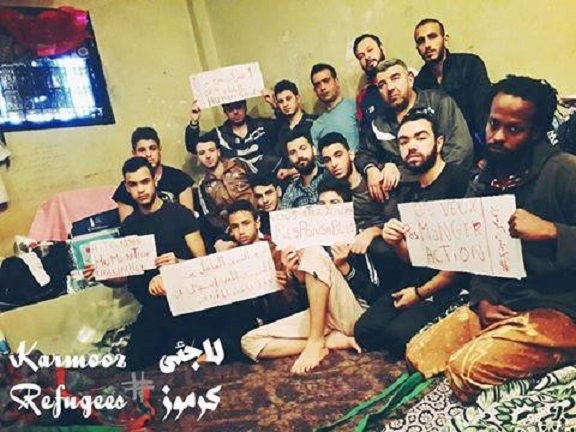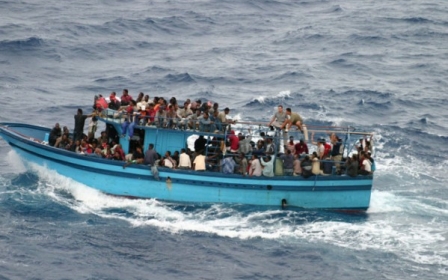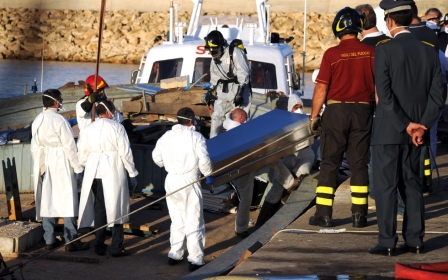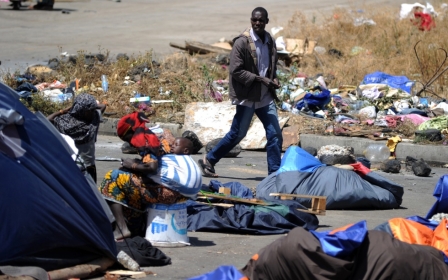Egypt's jailed refugees caught between hope and despair

CAIRO - A Somalian asylum seeker who originally fled his home country in 2007, Aly has been looking for something better for years.
While he may have originally left Somalia for safety reasons, caught in a “very bad situation … between the government and the mujahideen” (a reference to the country’s Al-Shabab militant insurgency) Aly says, without wanting to elaborate, that ultimately he was searching for stability. It’s a search that took him from Somalia in 2007 to Ethiopia, Kenya (then back to Somalia) and Sudan, before arriving in Egypt last year. He has used several smuggling networks around the Horn of Africa to cross countries, rivers and borders, and has been detained twice for “illegal immigration” in Sudan and Egypt.
Still he dreams of reaching Europe, as far-off and impossible as that dream might look from a badly ventilated room in an Egyptian police station.
“I wanted to have a better life and send money back to my family. My dream was to have a good job,” Aly told Middle East Eye by telephone from Karmouz police station. He originally tried to leave Egypt because he couldn’t find work or assistance from UNHCR.
“I just want a life. I want to forget the past.”
Aly: ‘The longest-held refugee’
In August, during what was meant to be the last leg of his journey - from past to future, on a boat to Europe - Aly was caught off-shore by the Egyptian authorities. He has been detained in Alexandria ever since.
Recently Aly entered his seventh month in detention in Karmouz, a place that has grown in notoriety since Aly’s Syrian and Palestinian-Syrian cellmates launched a hunger strike on 9 February. According to figures from the Sweden-based Centre for Refugee Solidarity, there are currently 89 detainees – 16 Syrians, 58 Palestinian-Syrians and 15 Somalis – including 15 minors (seven of whom are under 10 and one of whom is 10 months old).
“This is the longest [detention] time inside since the beginning of this effort” to document unprecedented migration since 2013, Kashef claimed. “Aly is the longest-detained refugee [currently] in a police station in Egypt.”
While Aly sardonically says he has “got to know what freedom and health really means” since he was first arrested, he cannot think why he is still there. “I don’t understand why I’m being detained,” he said.
For one, Aly says he has not been kept abreast of his case. The clearest indication he has had so far was a trip to the immigration office more than two months ago to prepare for his deportation, but then the Somalian embassy allegedly refused to pay for his flight. There have been assurances from aid organisations, Aly says, but no progress.
Most of all, and quite simply, Aly also does not understand why he is being treated like a criminal.
“It was me that chose to risk my life,” he protested. “I didn’t steal, I didn’t kill anyone - I’m not a criminal…It was my life.”
But the criminalisation of those trying to cross borders irregularly is arguably a matter of policy, not just one-off cases.
Karmouz: A case of ‘distinctly arbitrary’ detention?
A new report by the Nairobi-based Regional Mixed Migration Secretariat (RMMS) claimed that “many states in the region…have introduced measures that are intended to tighten their border controls and to prevent the arrival of irregular migrants on their territory.” But, it added, “There is little evidence that this strategy is achieving these stated security and deterrence goals.”
Aly was detained in Sudan. Undeterred, he tried to travel irregularly from Egypt months later and was detained again. But his story says a lot about immigration detention and migration around the Mediterranean.
Aly was largely forgotten about inside Karmouz, perhaps a symptom of what Caitlin L Chandler, in a recent Africa Is A Country blog, argued reflects a “hierarchy of refugee stories” based on the current focus on Syrian refugees around the Mediterranean, as opposed to the Africans who have been making the trip for decades. The English-language media has covered the Syrian diaspora voluminously, Chandler argued, while journalists “barely registered the escalating Eritrean refugee crisis”. This, despite the fact that Eritrean refugees made up the second-largest group of people crossing the sea in 2014 after Syrians, according to UNHCR figures.
Kashef acknowledges the argument but disagrees with it, instead arguing that in detention, nationality doesn't matter. “I think there is no difference if you’re Syrian or Somalian, or an African from the Comoros Islands…it’s the same system,” he said, explaining how refugees detained in Alexandria could be deported, held in administrative detention or released with an extended residency. “It’s about the system, not the nationality…There is no solid rule.”
According to the Geneva-based Global Detention Project (GDP), Egypt’s “application of [immigration] law can vary considerably from case to case”, depending on where a person is detained, their nationality or the detaining authority. Several legal instruments deal with illegal or irregular immigration, but they are rarely uniformly applied. The GDP also argues that the way in which detainees in Egypt are detained is often “distinctly arbitrary, particularly in the case of Syrians”.
Guests, criminals, infiltrators
Ramy, a Palestinian-Syrian refugee, has been inside Karmouz almost as long as Aly.
Ramy had fled to Egypt before the summer 2013 overthrow of former President Mohamed Morsi. Following the overthrow, he went back to Syria. Egypt no longer felt like a friend to the Syrians and Ramy’s family had invited him back.
Then on Valentines’ Day last year, Ramy says, an explosive ripped through their home in Qudsiya in the Damascus countryside, killing his daughter and several family members. He left Syria for the diaspora a second time, racked by grief, doubly determined to reach Europe. “I can’t go back to Syria because I buried my daughter there,” Ramy said back in September[1] . “I can’t go back.”
Ramy was apprehended at sea on 17 September and taken to Anfoushy Youth Centre, a state-owned sports club turned immigration detention facility that operated between September and November last year. He arrived on the day of its inauguration, when Alexandria’s former governor Tareq al-Mahdi was busy telling a group of tired, anxious-looking refugees and migrants that they would be treated as “guests”, not criminals. Aly was there too.
But that language has since changed.
Since September the Foreign Ministry has repeatedly stressed the government’s right to detain those crossing Egyptian borders “illegally”, while interior ministry public relations department representative Tareq Wafa told flagship state newspaper Al-Ahram last month that the Karmouz detainees were “infiltrators”, not “official refugees”. The group were being referred to prosecutors for “breaking the law and illegal immigration”, he added.
Since February 9, facing seemingly endless detention and apparently no movement from European states to resettle them, the Karmouz refugees turned to a hunger strike in an attempt to expedite their release or better still, resettlement. At least 50 people originally joined, although now 30 people are thought to be participating in either a full or partial hunger strike.
Ramy for one has started eating again, buoyed by the possibility that news articles and social media campaigns surrounding the strike have amplified the voices inside Karmouz. A CRS statement suggested the decision was taken “after the refugees received assurances from the UNHCR's office in Egypt that it will work to find a solution to their situation”.
Meanwhile, a UNHCR statement sent to Middle East Eye on Monday said, “UNHCR continues to advocate with the government for the release of all the group who have now been in detention for more than four months, and to find solutions for this group as soon as possible.”
Assurances, even if refugees inside can’t pinpoint their source, have given way to hope. “Me and others started to eat again because it seems like there’s good news - that countries might want us,” Ramy said. “My friends in prison [with me] have seen it on the internet. We don’t know which websites but countries - even the United States and the UK - have said they want to allow people to come.”
Ramy, like everyone in Karmouz, still wants to reach Europe - this time through humanitarian resettlement.
“For sure, I want to go to Europe. But it has to be another way, not by the ‘trip of death’,” he said.
According to a source who attended meetings, UNHCR, aid organisations and European embassy staff in Cairo have met to discuss the situation in Karmouz, exploring potential resettlement opportunities. But a solution is probably still a long way off - not least for the 70 Palestinian-Syrians who have no organisation to effectively advocate on their behalf, a symptom of the cavernous “protection gap” formed by Egyptian policy and the sub-clauses of international law.
Both Egyptian and foreign governments will likely want to avoid setting a precedent - by giving the impression to future detainees that detention is a route to resettlement, for example - immediately before the “peak season” for smuggling and migration begins, in late March or April, and with it, another unprecedented wave of migration crosses the Mediterranean. The Egyptian government is said to be unwilling to release the Karmouz group in the meantime, the source added.
Heba Mansour, an activist from Alexandria’s Refugee Solidarity Movement, also warned that soon more refugees will be detained as the smuggling boats fill up again, meaning Alexandria’s immigration detention estate will come under yet more strain.
“In the next few days, or by the end of the month, we’re going to hear about the first boat caught off the coast," Mansour said. “It’s a disaster.”
Kashef believes that ultimately Aly has a way out. Ramy, as a Palestinian-Syrian in a country with a well-established “protection gap” for stateless Palestinians, may not be so lucky. The same goes for the 70-plus other Palestinian refugees from Syria inside Karmouz.
“Ramy’s problems are bigger than Aly’s. UNHCR can deal with Aly’s situation and find him another homeland; reach a deal with the Egyptian government to get him a yellow card [for registered asylum seekers] and get residency in-country,” explained Kashef. “He’s been in for a long time, but there’s a solution.
“But for Palestinian-Syrians, it’s a problem … and I don’t know what the solution is. Will the Egyptian government agree to give [Ramy] residency or not? UNHCR doesn’t deal with the Palestinians and the Palestinian Consulate can’t find a solution for the moment, so what?”
Refugee or asylum seeker, Somali or Palestinian, Karmouz is not somewhere where things happen fast.
But while debates continue about opening up legal routes to Europe, especially for people like Ramy and Aly, the two men must wait in detention, caught somewhere between hope and despair.
Middle East Eye propose une couverture et une analyse indépendantes et incomparables du Moyen-Orient, de l’Afrique du Nord et d’autres régions du monde. Pour en savoir plus sur la reprise de ce contenu et les frais qui s’appliquent, veuillez remplir ce formulaire [en anglais]. Pour en savoir plus sur MEE, cliquez ici [en anglais].




